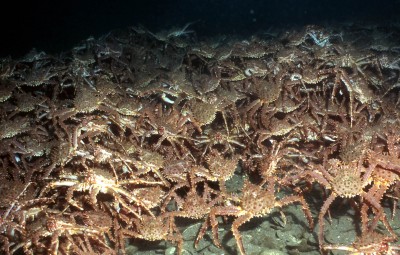The World Wildlife Fund (WWF) has demanded that the red king crab be eradicated from Norwegian waters. Its elimination would put an end to one of Norway’s most valuable seafood bonanzas.

This year’s crab harvest has so far fetched NOK 250 million (USD 40 million), reports newspaper Aftenposten. While Norwegian authorities are treating the crab as an important and valuable resource, the WWF claims the crab is a harmful alien species that Norway has a duty to eradicate.
“What the government is doing is a crime against the environment,” Nina Jenssen in WWF Norway told Aftenposten. “We insist that the crab be removed.”
She says that Norwegian authorities have worked actively to increase stocks, despite international regulations that call for alien species to be countered with all means available. The Norwegian government has previously stated that the red king crab was already established before the UN Convention on the Law of the Sea (UNCLOS) and Rio Convention on Biological Diversity. Consequently Norway is not bound to eradicate the crab.
Lucrative restaurant market
According to Aftenposten, fishermen in Eastern Finnmark county have sold crab for NOK 100 million this year, which turns into some NOK 250 million by the time the catch comes to market. A recent innovation has involved shipping live crabs in tanks by air to Japan and New York City, fetching prices of NOK 500,-/ kg (USD 38,-/lb). The red king crab from Norway has emerged as a delicacy popular in the restaurant business because of its texture, flavour and abundance of meat. No other Norwegian seafood product fetches higher prices per kilo.
The authorities had set a boundary for the red king crab at Norway’s North Cape. Further east the crab catch is strictly regulated, but to the west of the North Cape, an alleged “free-for-all” catch designed to destroy the stock has been underway. Despite this, the red king crab is gradually advancing further west.
In the managed area between the North Cape and the Russian economic zone, the value of the crab catch has topped that of cod fishing, the traditional mainstay of the local fishing economy.
“The crab is here to stay, whether we like it or not,” senior researcher and crab expert Jan H Sundet of Norway’s Institute of Marine Research (Havsforskningsinstituttet) told Aftenposten. “As we see it, there are no good solutions to the problem. It is our job to find the least damaging way forward.”
Scavenger of the sea
Sundet said the red king crab “eats almost anything that sits on the sea bottom,” acknowledging that in areas of the Varanger fiord where the crabs have been established in large numbers and over an extended period, “the fauna on the seabed has changed significantly.” He also tells of problems for the fisheries, where the long-legged crabs get stuck in nets used for other forms of fishing, and eat bait from fishing lines dragged over the sea bottom.
On the positive side, he says that many of the economically marginal fishing villages along the coast, east of the North Cape, such as Bugøynes, Kiberg and Båtsfjord, have blossomed after the arrival of crab processing plants. He adds that the unfettered fishing west of the North Cape has significantly reduced numbers and slowed the westward migration of the red king crab.
Views and News from Norway/Sven Goll
Join our Forum if you’d like to comment on this story.

